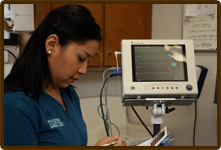Diagnostic Services Offered by Ruidoso Animal Clinic
At Ruidoso Animal Clinic, we offer a variety of diagnostic services for your pet. Pet diagnostics are designed to identify health problems as well as their level of severity so that treatment can be planned. Our diagnostic services include:

- Radiology Services: Our on-site digital X-ray equipment provides high quality radiographs to aid in the diagnosis and evaluation of many conditions including fractures, urinary blockage, bowel obstruction, and respiratory distress.
- Ultrasound: We can provide complete abdominal and cardiac ultrasound as needed for patient evaluation. Pregnancy ultrasounds can aid in determining the number of fetuses and stage of gestation. If needed, we can use telemedicine to submit the studies to specialists around the country.
- Endoscopy: We perform endoscopy when needed to diagnose difficult cases.
- Electrocardiography Services: We provide ECG services on-site as well as consultations with cardiology specialists.
- Laboratory: Our in-house laboratory allows us to perform cultures and cytologies, fecal examinations for internal parasites, tests for Heartworm, Lyme disease and Ehrlichia, the Feline Leukemia virus and much more. We have full capability of running immediate chemistry, hematological, and urinalysis tests on our IDEXX VetLab Station. We also use several commercial veterinary laboratories for specialized diagnostics and consultations.
- Digital Dental Radiology: We provide digital dental radiology in order to capture accurate and detailed images of your pet’s oral structure so we can identify any underlying oral health concerns.
What is AIS PennHIP?
- Hip dysplasia is a complex genetic disease characterized by a malformation of the hip joint that leads to the development of arthritis.
- PennHIP is a preventative screening tool for canines (as pets and breeding canines) which assesses the risk of developing osteoarthritis (OA) due to hip dysplasia.
- PennHIP uses radiographs obtained and submitted by a certified veterinarian or veterinary technician to assess joint laxity. The report provided by PennHIP provides a distraction index that indicates the risk for developing OA as well as breeding guidance.
How is PennHIP performed?
- PennHIP procedure can be performed on any canine 16 weeks or older.
- The canine must be fully anesthetized for the radiographs (x-rays) to be obtained. We will often recommend pairing the procedure with their spay/neuter or dentistry.
- PennHIP radiographs obtained MUST be submitted to AIS PennHIP for interpretation.
- Three different views are obtained and submitted to AIS PennHIP for assessment
- Hip extended view: identify radiographic signs of hip arthritis also known as osteoarthritis (OA).
- Compressive view: identify anatomic landmarks of the hip and determine how well the femoral head fits into the acetabulum (how well the “ball” fits into its socket”).
- Distractive view: specific to the PennHIP procedure. Assess joint laxity of the hps which has been linked to osteoarthritis formation. Uses compression of a distractor to induce laxity if present
Why should you consider PennHIP?
- Obtain the risk of hip dysplasia in your pet, especially for higher risk breeds like Labrador Retrievers, Golden Retrievers, German Shepherds, Great Danes and St. Bernards, among many others.
- Breeders should use PennHIP to assess breeding stock. Canines with lower DI numbers or tighter hips should be used to breed. Selective breeding for hip laxity and thus hip dysplasia helps to decrease the number of affected canines in the world.
Who can perform PennHIP radiographs?
- Any certified veterinarian or registered veterinary technician can perform and submit PennHIP radiographs. At Ruidoso Animal Clinic an appointment can be made with Dr. Brooke Thurstonson, who meets these requirements.

